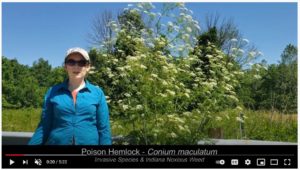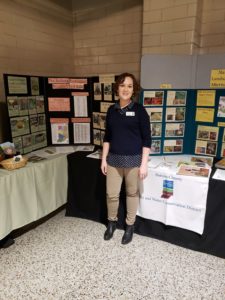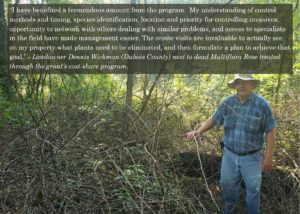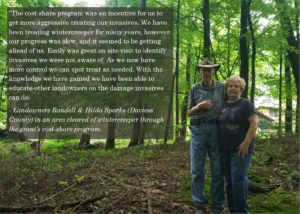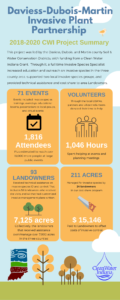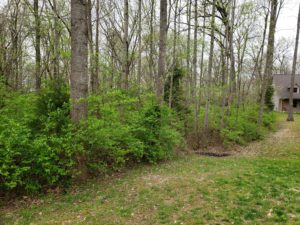For several years area Soil & Water Conservation Districts (SWCDs) have worked to address the threat of invasive species such as Honeysuckle, Autumn Olive, or newer invaders like Japanese Stiltgrass. That is why they are happy to report on the successes of a 2018-2020 Invasive Species Project, and their plans to continue this work in 2021.
The 2018-2020 Invasive Species Project was a collaboration between the Daviess, Dubois, and Martin County SWCDs. It was made possible with funding by a Clean Water Indiana grant from the Indiana State Department of Agriculture’s State Soil Conservation Board. The project established an Invasive Species Specialist position who increased invasive species education/outreach in the three counties, and supported private landowners managing invasives through technical assistance and cost share.
The Specialist position was first held by Megan Ritterskamp in 2018, and then Emily Finch in 2019 and 2020. One of the project’s first successes was establishing the new Daviess-Martin Cooperative Invasive Species Management Area (CISMA). Since its first meeting in December 2018, the CISMA has created a facebook page, a brochure, and developed a Mission Statement (https://www.facebook.com/DaviessMartinCISMA). Partner agencies and citizen volunteers help the CISMA to reach the community with informational booths and events such as the Bluffs of Beaver Bend Wildflower Walk and Glendale Resource Management Fair.
The Daviess-Martin CISMA Mission: To educate, assist, and connect people to protect our native wildlife and habitats from the impacts of invasive species.
With help from the new CISMA, as well as the existing Invasive Species Awareness Coalition of Dubois County (www.isacdc.org), this project supported a total of 71 events, directly attended by 1,816 people, and estimated to have reached over 13,000 more with educational booths at public venues. The SWCDs could not have done this without CISMA volunteers, who logged over 1,000 hours during planning meetings and events. Beyond events, the project also developed 17 new handouts about invasive species, including a colorful AlterNATIVE series that highlights native landscaping alternatives to popular invasive landscaping such as Callery (Bradford) Pear and Burning Bush. In fact, the two local CISMAs also raised awareness of these invasives through a billboard campaign with the taglines “Callery ‘Bradford’ Pears are Pretty…Awful!” and “Breakup with Your Burning Bush!”
In 2020, invasive species outreach adapted to covid with several online events and recorded videos. This included videos on managing poison hemlock, a pre-recorded invasive species 101 video for area
schools, and attending virtual meetings of local girl scouts and master gardener groups. The most popular virtual event was a recorded wildflower walk at the Bluffs of Beaver Bend during stay-at-home orders. This 30 minute video is available to view at https://youtu.be/TKJ6u3RxSjU, or by searching for the Daviess-Martin CISMA on YouTube or Facebook.
One of the biggest impacts of this project was the assistance it provided for area landowners. Over the three years the Specialist provided technical assistance to 93 landowners/managers, managing over 7,000 acres in the three counties. Of those landowners, 58 received site visits and 44 received customized invasive management plans. The project also offered cost-share of up to $800 for landowners to control invasive plants on up to 10 acres. In the end, 24 landowners successfully completed control efforts on 211 acres, utilizing $15,146 of cost-share funds provided by the grant. Proving that invasive control work can be both difficult and expensive, participating landowners recorded an additional $11,435 in expenses, and 2,000 hours of unpaid labor for their efforts. Landowners also expand our efforts in the community, sharing their knowledge of invasive species management and encouraging neighbors in invasive control.
While 2020 marks the end of this project, the SWCDs are excited to continue their partnership into 2021. A new 2021-2023 Clean Water Indiana grant has been awarded to support the Invasive Species Specialist position, continuing invasive species outreach and technical assistance to landowners. The new grant also adds another invasive species management goal, conducting roadside surveys of priority invasive plants such as Poison Hemlock and Phragmites. Specific survey plans are being developed, and the hope is to contact landowners with invasives found adjacent to areas where highway departments are already conducting control efforts. Unfortunately, funding was not approved to continue to offer invasive control cost-share to landowners, though the SWCDs may explore other funding options to incentivize control of invasive populations discovered during the road surveys.
If you have a question for the SWCD Invasive Species Specialist, or would like a free site visit to assess the invasive species on your property, contact Emily Finch at Emily.Finch@in.nacdnet.net or 812-482-1171 x3.
